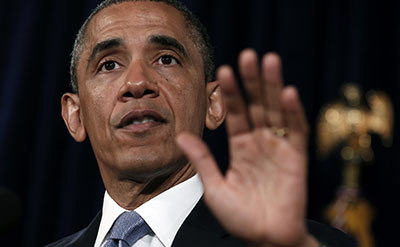Erdogan threatens to shut down YouTube, Facebook
New York, March 7, 2014–The Committee to Protect Journalists is concerned by Turkish Prime Minister Recep Tayyip Erdoğan’s threats to shut down YouTube and Facebook in order to, in the premier’s words, prevent the negative impact of the Internet on society.

Turkish Internet bill would deepen press freedom crisis
The Turkish parliament is on the verge of voting on radical censorship measures that, if approved, would allow the government to block individual URLs without prior judicial review, mandate Internet data retention for periods of up to two years, and consolidate Internet Service Providers (ISPs) into a single association, among other changes. If passed, the…

Secrecy, scale of PRISM raise alarms
Government surveillance of electronic communications “should be regarded as a highly intrusive act that potentially interferes with the rights to freedom of expression and privacy and threatens the foundations of a democratic society,” Frank La Rue, U.N. special rapporteur for freedom of expression, warned in a report issued less than two months ago. “States should…
Egyptian court bans YouTube for one month
The Cairo Administrative Court ordered the government-run National Telecommunication Regulation Authority (NTRA) on February 9, 2013, to ban YouTube for one month after the website failed to remove a video widely considered anti-Islamic, according to news reports. Similar judicial attempts to block websites have been overturned on appeal in the past.
Tajikistan blames censorship on complaints by citizens
In the last year, CPJ has documented a disturbing trend of attacks against the press in Tajikistan: the frequent blocking orders that the State Communications Agency has issued to local Internet service providers. Delivered in most instances via text message, the orders urge the ISPs to block nationwide access to local and international news websites…
Pakistan’s problematic record on Internet restrictions
The fleeting nature of YouTube’s availability in Pakistan this weekend–the site, which has been banned in the country since September, was unblocked for a whole three minutes–is only the latest emblem of Islamabad’s erratic and confounding approach to Internet censorship. Those who have been hoping for less opaque tactics apparently are in for disappointment.

Video emerges of Ukrainian journalist captive in Syria
New York, November 14, 2012–A Ukrainian journalist who was kidnapped in Syria in mid-October appeared in a short video last week pleading for her embassy to meet the demands of her captors, according to news reports. At least two other international journalists are believed to be held captive in Syria and the whereabouts of a…
Iran steps up its campaign against the press
New York, October 3, 2012–In a flurry of new anti-press actions in Iran, a jury has voted to convict a Reuters bureau chief on anti-state charges while authorities have jailed the head of the state’s official news agency, blocked Google services, and shut one reformist newspaper.